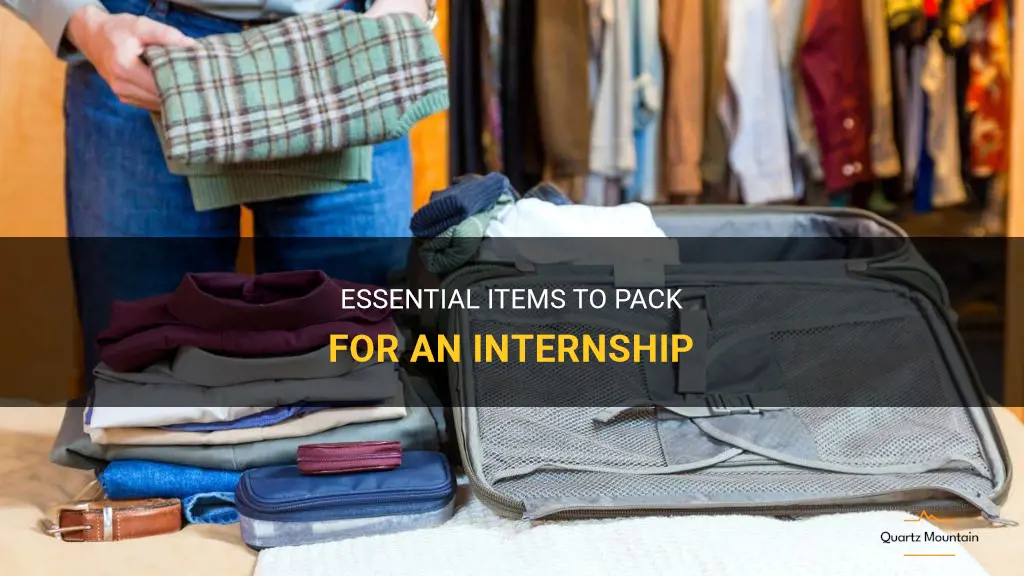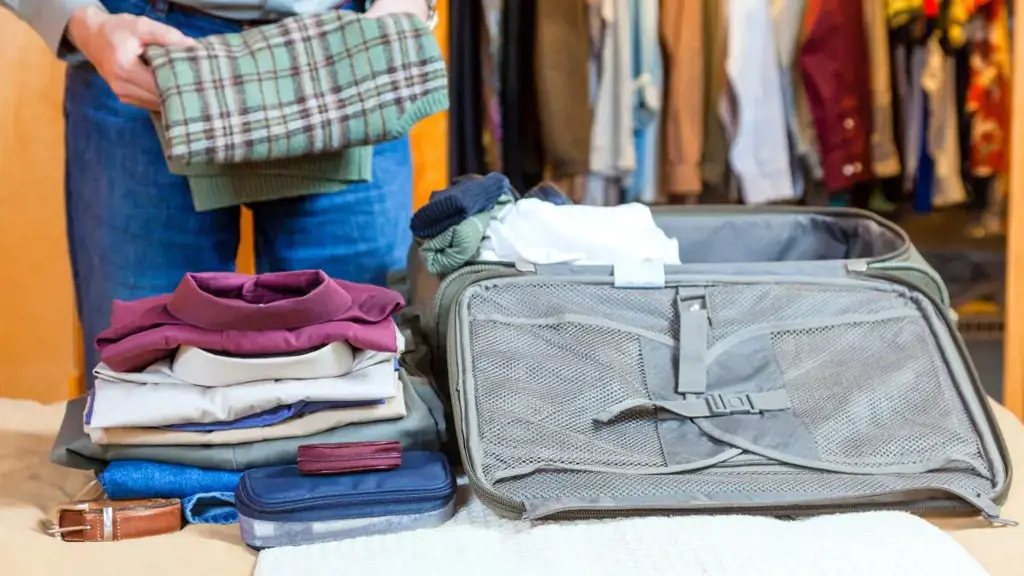
Are you about to embark on an exciting internship opportunity? Congratulations! Internships are a fantastic way to gain real-world work experience and make valuable connections in your industry. As you prepare for this new chapter, it's important to pack the essentials that will help you succeed during your internship. From practical items like a professional wardrobe to technology and office supplies, this guide will outline the must-have essentials to pack for your internship.
| Characteristics | Values |
|---|---|
| Clothing | Professional attire |
| Technology | Laptop, charger, and cables |
| Stationery | Notepad, pens, and sticky notes |
| Personal Care | Toiletries, deodorant, and hand sanitizer |
| Documents | Identification, resume, and contracts |
| Snacks | Granola bars, fruits, and nuts |
| Comfort items | Pillow, blanket, and headphones |
| Medications | Prescription drugs, pain relievers, and first aid kit |
| Accessories | Backpack, umbrella, and sunglasses |
| Entertainment | Books, podcast, and headphones |
What You'll Learn
- What are the essential items to pack for an internship?
- How should I plan my suitcase for a summer internship abroad?
- Are there any specific clothing items or accessories that I should bring for a professional internship?
- What kind of technology or equipment should I bring for my internship?
- Are there any documents or paperwork that I should bring for my internship?

What are the essential items to pack for an internship?

With internships becoming an increasingly important part of a student's education and career development, it is crucial to make sure you are well-prepared for the experience. This includes packing all the essential items that will help you navigate through your internship smoothly and comfortably. Whether it is a summer internship or a semester-long one, here are some key items that you should consider packing for your internship:
- Professional attire: Dressing appropriately is of utmost importance during an internship. Depending on the industry and company culture, you may need to wear business formal or business casual attire. Make sure to pack clothes that are clean, ironed, and fit well. A few suits, dress shirts/blouses, skirts/trousers, and a pair of comfortable yet professional shoes should be on your list.
- Laptop and chargers: Most internships require you to bring your own laptop. Make sure it is fully charged before you leave and that you have all the necessary chargers and adapters. If possible, consider investing in a portable charger for those days when you are unable to find an outlet.
- Notebook and pens: Taking notes during meetings and keeping track of important information and tasks is essential in any internship. Bring a notebook to jot down ideas, questions, and reminders. Pack a few pens that work well for you and are comfortable to write with. It may also be helpful to have different colored pens for organization purposes.
- Professional backpack or bag: Having a sturdy and professional backpack or bag to carry your belongings is crucial for any internship. Look for something that is large enough to hold your laptop, notebook, and other essentials, but not too bulky or informal. Opt for a classic design in neutral colors that suits any environment.
- Identification and important documents: It is always a good idea to carry a valid form of identification and any necessary documents with you at your internship. This could be your driver's license, passport, social security card, or any other forms of identification required by the company. Additionally, bring copies of your resume and any other relevant documents that may be needed during your internship.
- Snacks and water bottle: Depending on the length of your workday and the availability of food options, it is wise to pack some snacks and a reusable water bottle. Healthy snacks like granola bars, nuts, or fruit provide a quick energy boost and keep you focused throughout the day. Staying hydrated is essential, so having a water bottle with you will help you avoid spending money on bottled water and reduce plastic waste.
- Personal hygiene products: It is important to maintain personal hygiene throughout the day. Pack travel-sized toiletries such as hand sanitizer, wet wipes, tissues, and a small deodorant to freshen up during bathroom breaks or after your commute. Having these items handy will help you feel more comfortable and confident during your internship.
- Business cards and LinkedIn profile: Networking is a crucial aspect of any internship. Have a few business cards with your basic contact information, such as your name, phone number, and email address. This will make it easier to exchange information with colleagues, supervisors, and potential mentors. Additionally, having an updated LinkedIn profile can help you connect with professionals in your field and showcase your skills and experiences.
Remember, every internship may have unique requirements, so it is important to check with your employer or internship coordinator for any specific items you should bring. Packing these essential items will ensure that you are ready to tackle your internship with confidence and professionalism.
Essential Items to Pack for a Trip to the Baltic States
You may want to see also

How should I plan my suitcase for a summer internship abroad?

Planning your suitcase for a summer internship abroad can be an exciting but daunting task. You want to ensure that you have everything you need for both work and leisure, while also being mindful of the weight and size restrictions imposed by airlines. In this article, we will provide you with a step-by-step guide on how to efficiently plan your suitcase for a summer internship abroad.
Step 1: Research the Weather and Culture of your Destination
Before you start packing, it is essential to research the weather and culture of your destination. This will help you determine the type of clothing you need to bring. For example, if you are interning in a tropical country, you will likely need lightweight and breathable clothing. On the other hand, if you are going to a conservative country, you may need to pack more modest outfits for work.
Step 2: Make a Packing List
Once you have a good understanding of the weather and culture of your destination, make a packing list. Divide the list into categories such as clothing, toiletries, electronics, and documents. This will help you stay organized and ensure that you do not forget anything important.
Step 3: Determine Your Luggage
Decide on the type and size of luggage you will be using for your trip. If you are planning on taking a lot of items, it may be worth investing in a larger suitcase or a backpack with ample storage space. Alternatively, if you are a minimalist packer, a carry-on suitcase or a backpack may suffice.
Step 4: Choose Versatile Clothing
When packing for a summer internship abroad, it is important to choose versatile clothing that can be mixed and matched to create different outfits. Opt for neutral-colored tops, bottoms, and dresses that can be easily paired with different accessories. This will help you maximize your wardrobe options while minimizing the amount of clothing you need to bring.
Step 5: Pack Essentials First
Start by packing the essentials such as underwear, socks, and basic toiletries. These items should go at the bottom of your suitcase or backpack. Fill any empty spaces with smaller items such as electronics or accessories.
Step 6: Roll Your Clothes
To save space and minimize wrinkles, roll your clothes instead of folding them. This technique allows you to fit more items in your suitcase while keeping them neat and organized. Place the rolled clothes on top of the essentials.
Step 7: Pack Shoes Appropriately
Shoes can take up a significant amount of space in your suitcase, so it's important to pack them efficiently. Place them in shoe bags or wrap them in plastic bags to protect your clothing from any dirt or odors. Consider limiting the number of shoes you bring and opt for versatile options that can be worn for both work and leisure.
Step 8: Pack Toiletries and Electronics
Pack your toiletries and electronics in a separate bag to prevent any spills or damage to your clothing. Use travel-sized containers for liquids and make sure to comply with the airline's liquid restrictions. Keep your electronics and chargers in a padded case to protect them during transit.
Step 9: Don't Forget Important Documents
Before you leave for your summer internship abroad, ensure that you have all the necessary documents such as your passport, visa, and internship acceptance letter. Keep these documents in a secure and easily accessible location, such as a travel wallet or a document folder.
Step 10: Review and Edit
After you have finished packing, take a moment to review and edit your suitcase. Remove any items that you can do without and make sure that you are within the weight and size limits imposed by the airline. It's always a good idea to weigh your suitcase using a luggage scale to avoid any surprise fees at the airport.
In conclusion, planning your suitcase for a summer internship abroad requires careful thought and organization. By conducting research, making a packing list, choosing versatile clothing, and packing strategically, you can ensure that you have everything you need for a successful and enjoyable experience. Remember to be mindful of weight and size restrictions to avoid any inconvenience or extra charges. Good luck with your internship!
Essential Gear for Hiking in Norway: A Complete Packing Guide
You may want to see also

Are there any specific clothing items or accessories that I should bring for a professional internship?

When it comes to dressing for a professional internship, it's important to make a good impression. The way you dress can greatly impact how you are perceived by your colleagues and supervisors. While dress codes may vary depending on the industry and company, there are some general guidelines that can help you navigate the world of professional attire.
Here are some specific clothing items and accessories that you should consider bringing for a professional internship:
- Business suits: A well-fitted business suit is a must-have for any professional internship. Opt for a neutral-colored suit such as black, navy, or gray. Make sure the suit is tailored to fit you properly and consider investing in a good quality suit as it can last for years.
- Dress shirts/blouses: Bring a few dress shirts or blouses in classic colors such as white or light blue. These can be paired with your suit or worn on their own with dress pants or a skirt.
- Dress pants/skirts: Depending on your personal preference and the dress code of your internship, bring a couple of dress pants or skirts. Stick to neutral colors that can be easily mixed and matched with your other clothing items.
- Professional dresses: If dresses are allowed in your internship, bring a few professional-looking dresses in neutral colors or subtle patterns. Make sure they are appropriate in length and fit.
- Shoes: Invest in a pair of comfortable and stylish dress shoes. For men, a pair of polished leather shoes is ideal. For women, opt for closed-toe pumps or flats. Avoid wearing sneakers or sandals, unless specified by your company.
- Accessories: Accessories can add a touch of personality to your professional attire. Consider bringing a classic watch, a belt that matches your shoes, and simple jewelry such as earrings or a necklace. Keep it minimal and avoid anything too flashy or distracting.
- Professional bag/briefcase: A professional internship may require you to carry important documents or a laptop. Invest in a professional-looking bag or briefcase that can hold all your belongings and looks polished.
Remember, it's always better to be slightly overdressed than underdressed for an internship. If in doubt, opt for a more formal attire until you become familiar with the dress code of your company. It's important to observe and follow the dress code guidelines established by your internship provider.
In addition to the specific clothing items and accessories mentioned above, it's also important to consider personal hygiene and grooming. Make sure your clothes are clean, wrinkle-free, and properly ironed. Pay attention to your personal grooming, including clean and well-groomed hair, nails, and overall appearance.
Lastly, dressing professionally is not just about the clothes you wear, but also about the way you carry yourself. Maintain good posture, make eye contact, and exude confidence. Remember, your professional attire should complement your skills and abilities, helping you make a positive impression during your internship.
Essential Items to Pack for Your Trip to Cartagena
You may want to see also

What kind of technology or equipment should I bring for my internship?

Starting an internship can be an exciting and nerve-wracking experience. Whether it's your first internship or you've had several before, it's important to be prepared and equipped with the right technology and equipment. In today's digital age, technology plays a crucial role in completing tasks efficiently and staying organized. Here are some essential items you should consider bringing for your internship.
Laptop or Tablet:
Having a reliable laptop or tablet is paramount for any internship. It allows you to access necessary software, email, and web-based tools easily. Depending on the nature of your internship, you may need specific software or programs, so ensure that your device is compatible with those requirements. Also, make sure your laptop or tablet has sufficient battery life to last throughout the day.
Smartphone:
A smartphone is a multitasking powerhouse that can help you stay connected and organized. With countless productivity apps available, you can use your smartphone to create to-do lists, set reminders, and manage your schedule. Additionally, having a smartphone allows you to easily communicate with colleagues and supervisors through phone calls, text messages, and emails.
Portable Charger:
While technology has advanced significantly, the battery life of our devices hasn't improved at the same pace. Carrying a portable charger can be a lifesaver, especially if you find yourself in situations where you don't have access to power outlets. It ensures that your phone and other devices remain charged throughout the day, allowing you to stay productive.
Noise-Canceling Headphones:
In many internships, you may find yourself working in a shared workspace or a noisy environment. Noise-canceling headphones can help you maintain focus and block out distractions, enabling you to concentrate on your work. They are particularly useful if you have to attend virtual meetings or listen to recordings where audio clarity is vital.
External Hard Drive:
Backing up your work regularly is essential to avoid any data loss or setbacks. An external hard drive provides an additional layer of security for your important files and documents. Should anything happen to your device, you can rest assured knowing that your data is safely stored on the external hard drive.
Notepad and Pen:
While technology plays a significant role in today's work environment, it's still important to have traditional tools at hand. Carrying a notepad and pen allows you to take quick notes during meetings or brainstorming sessions. Additionally, jotting down important information on paper can be more effective for memory retention than typing it on a screen.
Professional Backpack or Bag:
Having a reliable backpack or bag to carry all your technology and equipment is essential. Look for a bag with multiple compartments to keep your items organized and easily accessible. It's important to choose a professional-looking backpack or bag that aligns with the dress code and overall image of the internship.
Remember, every internship may have specific requirements, so it's essential to reach out to your supervisor or HR department to get a clear understanding of what you need to bring. By being well-prepared and equipped with the right technology and equipment, you can make the most out of your internship experience and ensure a smooth workflow throughout your time with the company.
Essential Items for a Memorable Weekend in Spain
You may want to see also

Are there any documents or paperwork that I should bring for my internship?

Starting an internship can be an exciting and overwhelming experience. As you prepare for your internship, one common question that often arises is what documents or paperwork you should bring with you. While the specific requirements may vary depending on the company and industry, there are several essential documents that you should have ready before your first day.
- Identification Documents: It is crucial to bring identification documents to verify your identity. These may include your passport, driver's license, or any other government-issued ID. Additionally, some companies may require a photocopy of these documents for their records.
- Work Authorization Documents: If you are an international student or resident, it is essential to have valid work authorization documents. This could include a work visa, employment authorization card, or any other relevant documentation that allows you to legally work in the country where your internship is taking place.
- Social Security or Tax Identification Number: In certain countries, such as the United States, interns may need a Social Security Number (SSN) or Tax Identification Number (TIN) to receive compensation and fulfill tax obligations. Make sure to check with your employer if you need to obtain an SSN or TIN before starting your internship.
- Proof of Enrollment or Academic Transcripts: Some companies may require proof of enrollment or academic transcripts to verify your educational background. This could include a letter from your university or copies of your academic records. It is a good idea to check with your internship coordinator or HR department beforehand to see if these documents are necessary.
- Emergency Contact Information: Having an emergency contact information sheet on hand is always a good idea. Include the names and phone numbers of your parent or guardian, as well as their email addresses. This information can be useful in case of any unforeseen circumstances or emergencies.
- Resume and Reference Letters: Although you may have already submitted your resume and reference letters during the application process, it is a good idea to bring physical copies to your internship. These documents can be helpful for your supervisor or other colleagues who may not have access to your digital files.
- Non-Disclosure or Confidentiality Agreement: Depending on the nature of the internship, you may be required to sign a non-disclosure or confidentiality agreement. It is crucial to carefully read and understand the terms of the agreement before signing. If you have any questions or concerns, don't hesitate to ask your employer or internship coordinator for clarification.
It is important to note that these are general documents that are often required for internships. However, every internship is unique, and the specific requirements may vary. It is always a good idea to reach out to your internship coordinator or HR department to confirm the necessary paperwork and documents before your first day.
In conclusion, it is essential to come prepared with the appropriate documents and paperwork for your internship. By ensuring you have the necessary identification, work authorization, academic, and emergency contact documents, you can start your internship on the right foot and focus on learning and growing in your new professional environment.
Packing Tips for an Unforgettable Club Med Vacation
You may want to see also
Frequently asked questions
When packing for your internship, it's important to consider the specific requirements and dress code of your workplace. Generally, it's a good idea to bring a professional wardrobe including appropriate business attire such as dress pants, blouses or shirts, blazers or jackets, and comfortable shoes. Additionally, you may want to pack a notebook and pens for taking notes, a laptop or tablet for any work-related tasks, and any necessary documents or paperwork.
While some workplaces may have a cafeteria or provide meals for employees, it's always a good idea to come prepared with your own lunch. Packing a healthy and satisfying lunch can help you save money and ensure you have something nutritious to eat during your break. Consider investing in a reusable lunch container and bringing easy-to-pack items such as sandwiches, salads, fruit, and snacks to keep you fueled throughout the day.
Bringing personal items to decorate your workspace can help you feel more comfortable and create a positive work environment. However, it's important to check with your supervisor or HR department about any company policies regarding personalization of workspaces. Some workplaces may have restrictions or guidelines on what can be displayed, so it's always best to ask for permission before bringing in any decorations such as photos, plants, or trinkets.
When packing your belongings for your internship, it's a good idea to organize and label your items to make them easy to locate and identify. Invest in a sturdy bag or backpack to carry your essentials, and consider using smaller pouches or organizers to keep items such as chargers, pens, and notebooks separate and easily accessible. It's also a good idea to pack a small emergency kit with essentials such as band-aids, pain relievers, and any necessary medication.
If you realize you've forgotten to pack something important for your internship, don't panic! Depending on the item, there may be options for borrowing or purchasing it once you arrive at your workplace. Reach out to your supervisor or colleagues to see if they have any extra supplies or equipment that you can borrow temporarily. Alternatively, you can also make a list of the items you need and plan to purchase them during your lunch break or after work. Remember, it's always a good idea to double-check your packing list before leaving to ensure you have everything you need.







